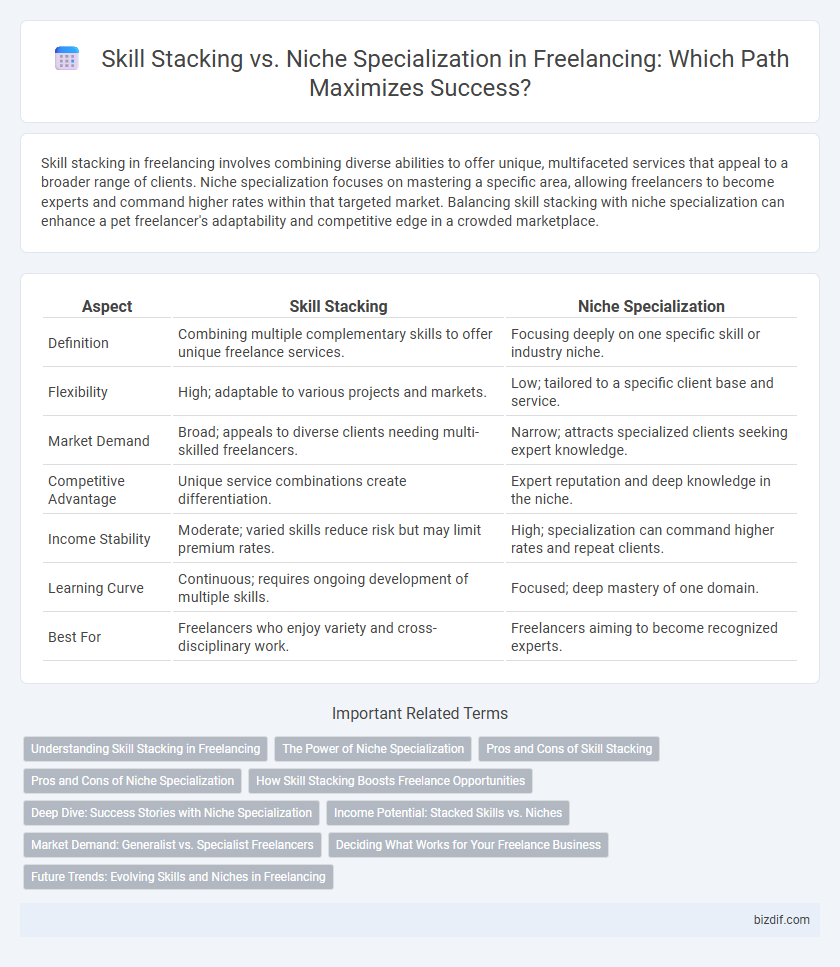Skill stacking in freelancing involves combining diverse abilities to offer unique, multifaceted services that appeal to a broader range of clients. Niche specialization focuses on mastering a specific area, allowing freelancers to become experts and command higher rates within that targeted market. Balancing skill stacking with niche specialization can enhance a pet freelancer's adaptability and competitive edge in a crowded marketplace.
Table of Comparison
| Aspect | Skill Stacking | Niche Specialization |
|---|---|---|
| Definition | Combining multiple complementary skills to offer unique freelance services. | Focusing deeply on one specific skill or industry niche. |
| Flexibility | High; adaptable to various projects and markets. | Low; tailored to a specific client base and service. |
| Market Demand | Broad; appeals to diverse clients needing multi-skilled freelancers. | Narrow; attracts specialized clients seeking expert knowledge. |
| Competitive Advantage | Unique service combinations create differentiation. | Expert reputation and deep knowledge in the niche. |
| Income Stability | Moderate; varied skills reduce risk but may limit premium rates. | High; specialization can command higher rates and repeat clients. |
| Learning Curve | Continuous; requires ongoing development of multiple skills. | Focused; deep mastery of one domain. |
| Best For | Freelancers who enjoy variety and cross-disciplinary work. | Freelancers aiming to become recognized experts. |
Understanding Skill Stacking in Freelancing
Skill stacking in freelancing involves combining multiple complementary skills to create a unique value proposition that sets freelancers apart in competitive markets. Unlike niche specialization, which emphasizes deep expertise in a single area, skill stacking leverages versatility by blending diverse abilities such as graphic design, copywriting, and digital marketing to offer comprehensive solutions. This strategy enhances adaptability and increases opportunities by catering to a broader range of client needs and projects.
The Power of Niche Specialization
Niche specialization allows freelancers to become experts in a specific field, increasing their market value and attracting high-paying clients seeking specialized skills. By focusing deeply on one area, freelancers can build a strong personal brand and create unique offerings that differentiate them from generalists. This targeted expertise often leads to more consistent work, higher client retention, and opportunities for premium projects in the freelancing ecosystem.
Pros and Cons of Skill Stacking
Skill stacking in freelancing combines multiple complementary skills to offer versatile services, increasing market adaptability and client opportunities. It enhances problem-solving abilities and reduces dependency on a single income source, but may dilute expertise in highly competitive niches. Balancing breadth and depth is essential to avoid becoming a generalist with insufficient mastery in any one area.
Pros and Cons of Niche Specialization
Niche specialization in freelancing allows professionals to develop deep expertise in a specific field, leading to higher demand and premium rates from clients seeking specialized skills. However, this approach risks market saturation and limited job opportunities if the niche becomes obsolete or overly competitive. Freelancers must weigh the benefits of authority and targeted marketing against the potential vulnerability to shifting industry trends.
How Skill Stacking Boosts Freelance Opportunities
Skill stacking enhances freelance opportunities by combining multiple complementary skills, making freelancers more versatile and attractive to diverse clients. This approach allows professionals to tackle complex projects requiring interdisciplinary expertise, increasing their marketability and earning potential. By integrating skills such as coding, design, and marketing, freelancers can create unique value propositions that niche specialization alone often cannot achieve.
Deep Dive: Success Stories with Niche Specialization
Freelancers who master niche specialization often achieve higher client trust and command premium rates by becoming recognized experts in specific fields like blockchain development or UX design for healthcare apps. Success stories highlight individuals who transformed careers by focusing deeply on industries such as fintech or legal tech, resulting in repeat business and competitive differentiation. This concentrated expertise drives targeted marketing, allowing specialized freelancers to build strong brand reputations and secure long-term, high-value contracts.
Income Potential: Stacked Skills vs. Niches
Freelancers leveraging skill stacking combine complementary abilities such as web development, graphic design, and digital marketing, enabling them to offer comprehensive services and command higher rates across diverse projects. Niche specialization in areas like cybersecurity or UX design often results in expert-level demand and premium fees within targeted markets but limits client variety. Income potential varies as stacked skills provide broad market appeal and multiple revenue streams, while niche specialists benefit from deep expertise and elevated industry positioning.
Market Demand: Generalist vs. Specialist Freelancers
Freelancers with skill stacking offer versatile solutions by combining multiple competencies, appealing to clients seeking broad expertise and adaptability. Niche specialization attracts clients who need deep, focused knowledge and top-tier proficiency in a specific area, often commanding higher rates. Market demand varies by industry, with generalists dominating rapidly changing sectors and specialists excelling in complex, technical fields.
Deciding What Works for Your Freelance Business
Skill stacking enhances a freelancer's versatility by combining complementary abilities such as web design, copywriting, and social media management, enabling access to diverse projects and higher income streams. Niche specialization positions a freelancer as an expert in a specific industry or service, like e-commerce SEO or mobile app development, attracting clients seeking targeted expertise and premium rates. Assess project goals, market demand, and personal strengths to determine whether broader skill sets or focused mastery will yield the best growth and client satisfaction for your freelance business.
Future Trends: Evolving Skills and Niches in Freelancing
Freelancers embracing skill stacking gain adaptability by combining diverse competencies like digital marketing, graphic design, and coding, which aligns with future trends demanding multifaceted expertise in emerging technologies such as AI and blockchain. Niche specialization, focusing deeply on areas like cybersecurity or UX design, remains valuable as industries seek experts to tackle complex, industry-specific challenges with cutting-edge solutions. The evolving freelance market increasingly rewards professionals who balance broad, complementary skills with deep domain knowledge to stay competitive in dynamic, tech-driven sectors.
Skill Stacking vs Niche Specialization Infographic

 bizdif.com
bizdif.com